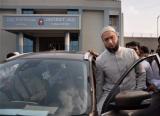 Hyderabad, Nov 6: The MIM has strongly opposed the idea of making Hyderabad a Union Territory on the lines of Chandigarh, in the event of bifurcation of Andhra Pradesh even as the party again made a strong pitch for a unified state.
Hyderabad, Nov 6: The MIM has strongly opposed the idea of making Hyderabad a Union Territory on the lines of Chandigarh, in the event of bifurcation of Andhra Pradesh even as the party again made a strong pitch for a unified state.
"We cannot accept Hyderabad as a Union Territory. We are also opposing Hyderabad as the common capital (for Telangana and residuary Andhra Pradesh) in the event of the state's division. Both the ideas are totally misconceived," Majlis-e-Ittehadul Muslimeen (MIM) chief and Hyderabad MP Asaduddin Owaisi asserted here today.
Addressing a press conference along with MLC Syed Amin Zafri at the MIM headquarters, Asaduddin said they would like creation of a Rayala-Telangana state by adding two out of four districts of Rayalaseema to the 10 districts of Telangana, if bifurcation of Andhra Pradesh could not be stopped.
"Whether I like it or not, division of the state looks a reality. Rayala-Telangana doesn't look to happen. But, in the interest of justice, the districts of Kurnool and Anantapur (of Rayalaseema) should be added to Telangana as Rayalaseema will be the worst sufferer in the event of the division. It will resolve the water issue or else there will be water wars," the MP said.
Apprehending that the bifurcation would "hurt the Muslims very badly," the MIM supremo also noted that it would hurt the backward Rayalaseema as well.
"Bifurcation will lead to miscarriage of justice against Muslims. Muslims, Christians and Dalits will be the losers in the event of the division while it will help the Sangh Parivar to grow strong," he added.
Lashing out at Congress leaders from Telangana for suggesting that law and order of Hyderabad could be under the Centre's control, Asaduddin said they did not have the right to barter over Hyderabad.
"Hyderabad should be given to Telangana without any condition in case of bifurcation. Government of India should realise that Hyderabad is not Chandigarh as there is no geographical contiguity. We can't accept the Centre controlling Hyderabad's law and order, revenue and municipal administration," he asserted.
"We are the biggest stakeholders of Hyderabad. We will first take to the streets, then to courts and next to polling booth on the status of Hyderabad," Asaduddin warned.
Noting that Hyderabad was the only growth engine for Telangana, the MIM chief said it should not be made the common capital of the two states.
"Let a clean separation be made," he demanded. The MIM, he said, submitted a detailed point-by-point response to the issues raised by the Union Home Ministry on the bifurcation issue.
Asked if he was hopeful the bifurcation would indeed happen in the current political scenario, the MP remarked: "Let the Bill come (to Parliament). Everything will become clear by December 8."
The MIM would attend the all-party meeting convened by the Union Home Ministry on November 12 and 13.
The demands MIM raised, in the event of the bifurcation, are: granting first language status to Urdu along with Telugu in the new state of Telangana, enactment of Prevention of Communal Violence legislation in the two states, national project status for Pranahita-Chevella Lift Irrigation Scheme, handing over of AP Bhavan in New Delhi to Telangana and separate High Court for the residuary state of Andhra Pradesh.





Comments
Add new comment